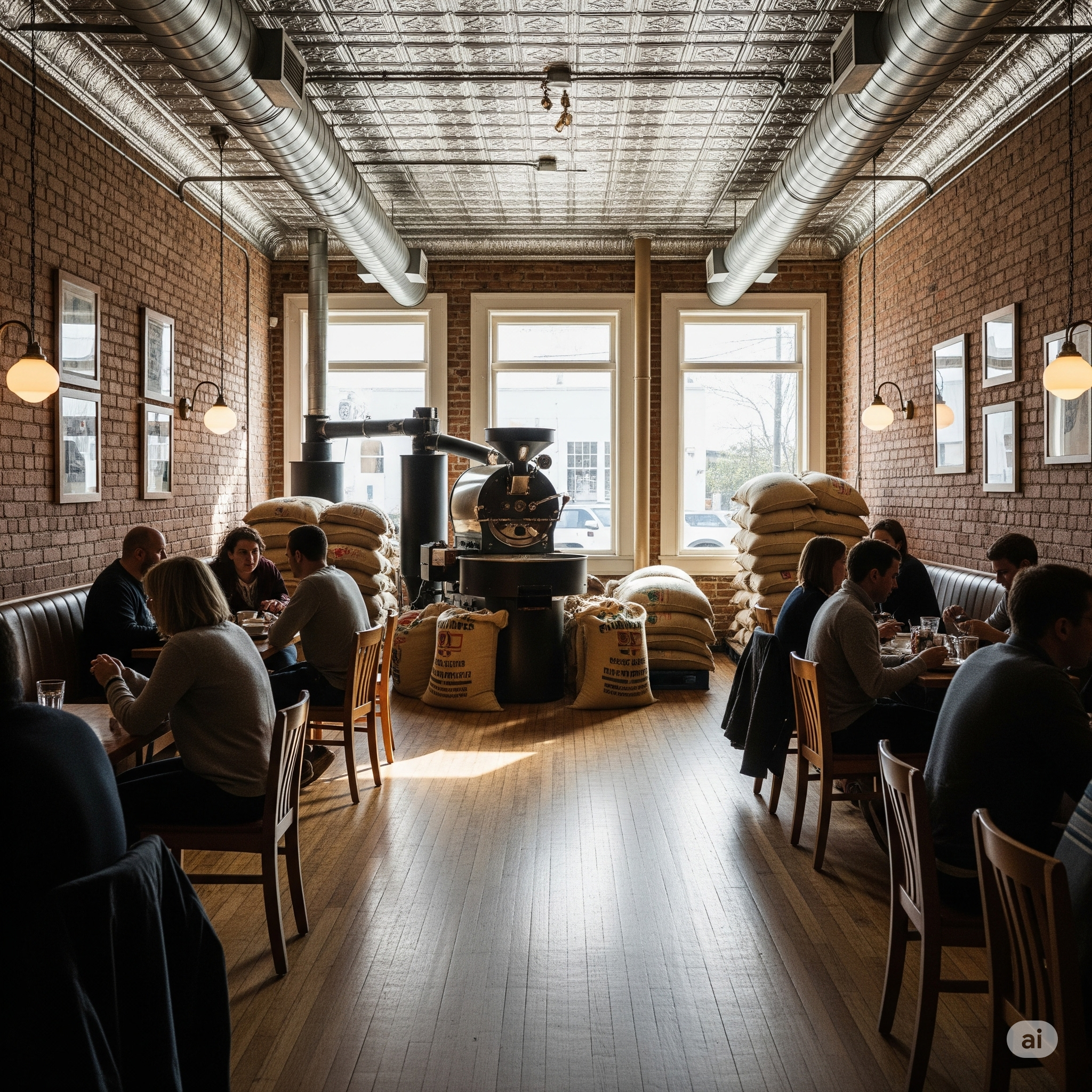Coffeehouse Stories, Part 2: fight for survival
This is an ai’s rendition of my former cafe. Ai doesn’t konw not to put green coffee in direct sunlight :0
When I moved to Amherst, MA in 1994 to open Rao’s Coffee Roasting Company, I had hoped for a warm welcome. While the college students embraced the cafe from day one, many of the townspeople seemed offended I, a young outsider, would open the cafe in their town. Almost every morning during the quiet, early days of the business, a townie would walk in, look around in a nosy way, walk up to the bar, and say something hostile like “why did you come to our town?” or “don’t you know every business in this space before you failed?” or “we don’t need another coffee shop. We already have five.”
I was nervous, as I had gone deeply in debt to open my first business at age 22, in a town where I knew no one. That was not the welcome I had hoped for. A growing feeling of unease peaked one day when I answered the phone to the sound of someone screaming and claiming the coffee roasting was killing him, and hung up without explaining. A few days later, the town health inspector came to the back door of the cafe, and yelled at me, red faced, veins bulging from his neck, saying people were complaining about the roasting, and that he would shut down the business if I didn’t fix the problem.
It wasn’t clear who was complaining or what, exactly, they wanted. They were complaining about the smell of the roasting, but would hang up immediately after yelling. I received several more angry phone calls, and tried to ask the callers what they wanted. Did they want me to roast at night, or on the weekends? The one time I got a word in, I said I would try to accommodate them however they needed until I could install a pollution-control system on the roaster. No, the caller said, we just want you shut down. Then he slammed down the phone. I was unsure whether the callers’ motive was to stop the roasting or to get rid of the business because it was owned by an outsider and catered to students. I was petrified I would lose the business.
I purchased a pollution-control system for the roaster. A week later, one of the three complainers came to the cafe at 9pm on a weeknight. He said “I thought you might like to know, they’re having a meeting about you in the basement of the community center.” Legally, the town must announce meetings ahead of time and invite the public, so I knew this was a setup. This was a clandestine meeting in a basement, and I was the only one invited.
Of course, I went to the meeting. The Board of Health and the three complainers were there, waiting. During the meeting, I could hardly get a word in edgewise. The others insulted me personally and said the town had the power to shut down my cafe. I walked out of the meeting distraught, wondering if I was about to lose my business.
I did not sleep that night, and at 9am I called an attorney. The attorney told me the board had lied, and that there was a due process the town must follow. He said the process of shutting down the business would take a few months and that we could fight.
Over the next couple of weeks, members of the Board of Health came to the cafe sporadically. When I referenced the meeting, they said “what meeting?” Apparently, they knew the meeting was illegal, and they had decided to gaslight me and claim no such meeting had taken place.
I told some of my townie customers about the meeting, and Julie, a friendly regular, told me to write a letter asking customers to come to the meeting, and to only give the letter to townies, not students (the town had a history of hazing businesses that catered to students.)
Julie was insistent, so I followed her instructions, and handed out hundreds of letters. I also retained an attorney and an expert in industrial air-quality issues.
Shortly before these events, I had invested $15,000 in a system that included a water scrubber and two electrostatic precipitators to clean the roasting smoke and smell. Unfortunately, the system reduced the smoke and smell by only a small amount. I then found a better system and planned to order it.
On the day of the meeting, some members of the Board of Health came to the cafe and said “we hear many people are coming to the meeting.” “Great,” I said. “We are offended that you are turning this into a public issue.” Whaaaat? Did these corrupt, gaslighting assholes really think I was not going to fight back after they lied, insulted me, and threatened to shut down my business?
That night, hundreds of people came to the meeting. As people filed into the room, many would pat me on the shoulder, and say encouraging words like “don’t worry, we got this. We are sick of the town abusing businesses.” Local newspaper reporters came, and of course, the lawyer and the industrial air-quality expert were present.
When the meeting began, the Board of Health was visibly scared. They knew the entire room was against them. When the three complainers, accustomed to getting their way with the town, kept yelling and talking out of turn, the board had no choice but to eject them from the meeting. That left the board alone in a room with 300 angry townies.
The point of the meeting was to forge a compromise. I explained to the board that I had spent $15,000 on a system to clean the air, and acknowledged it wasn’t good enough. I told them I had found a better system that would cost $30,000 and I needed time to install it. I asked for three months to install the machine. The board accused me of “bluffing” and “stalling.” They protested and said three months was too long. However, they had no power, as the point of the meeting was to find a compromise, and they had ejected the other side. There was no one with whom to compromise. I pointed out to them that I could demand three years, and they would be legally obligated to approve it. They grudgingly agreed to the proposed three months.
Shortly after the meeting, the new system solved the problem, and the board mostly left me alone. The first time I saw the health inspector after that meeting, I told him I’d sue him for harassment if he ever crossed another line. After that day, he never again inspected the cafe.

